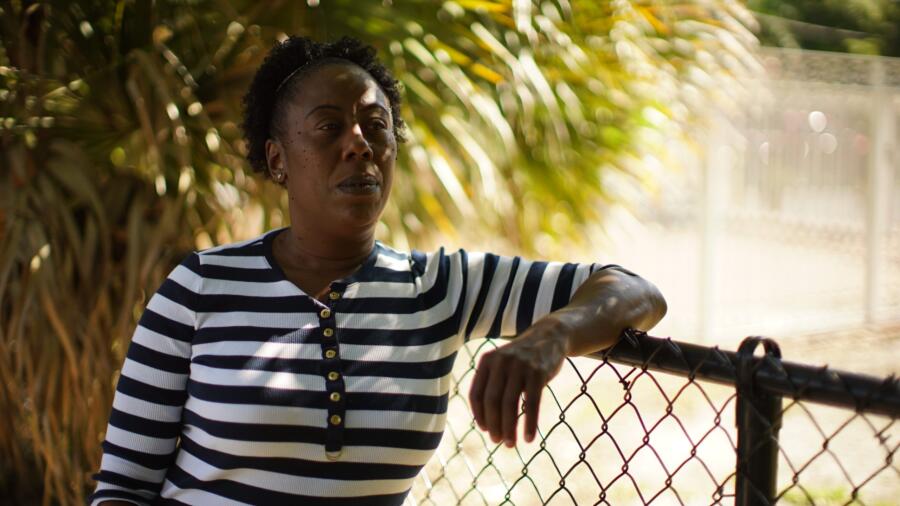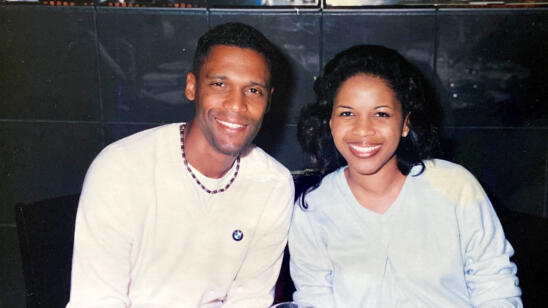On June 18, 1997, Keith Jones visited an adult entertainment club in Fort Myers, Florida, to watch his longtime friend, Michelle Ashley, perform. Later that night, the two checked into the Tides Motel together.
The next morning, motel staffers found the door to Jones’ room wide open and discovered his bloodied body on the bed.
After surveying the scene, police concluded that someone had robbed, beaten and shot 27-year-old Jones, a U.S. Marine Corps veteran who had recently completed training to become a police officer. They later identified four men—Richard Fraser, Philip Boyd, Jamal Manson and Gerard Jules—as suspects, but the Florida state attorney’s office decided not to arrest the men because of a lack of evidence. Eventually, the case went cold.
Then, in October 2019, more than 22 years after Jones’ death, prosecutors charged then-42-year-old Ashley in connection with the killing.
Ashley, also known as Michelle Jackson, maintained her innocence throughout the ensuing criminal process, saying she had nothing to do with the fatal robbery and that she herself was a victim. Prosecutors, however, argued that although Ashley did not pull the trigger herself, she orchestrated the plot that resulted in Jones’ death and was ultimately responsible for his killing. They charged her with first-degree murder with a firearm, a crime punishable by life in prison.
The case against Michelle Ashley is the subject of an episode of A&E’s Accused: Guilty or Innocent? which you can stream in the A&E app.
What Happened to Keith Jones in 1997?
After fighting in Saudi Arabia with the Marines, Jones returned to Florida and enrolled in the police academy at Daytona State College. He’d just taken his state exams to become a law enforcement officer when he decided to venture south to Fort Myers to visit Ashley. The two had both grown up in Daytona Beach and had become acquainted through Jones’ sister.
“He was a good friend to me,” says Ashley in Accused: Guilty or Innocent? “He was somebody that I could talk to and he was a good person.”
When he arrived in Fort Myers on that night in June, Jones paid Ashley to dance for him at the nightclub where she worked, Lookers, then invited her back to the motel, according to Ashley. There, the two talked and had sex before Ashley went back to work at the club, she says. Later, Jones called and asked Ashley to come back to the motel. She agreed and asked a friend at the club to give her a ride.
The two spent more time together in the room and, while Ashley was preparing to leave, four men rushed through the door, she says. According to Ashley, the men argued with Jones and rifled through both of their belongings. Then, Ashley heard a loud knocking sound, which she later determined must have been the sound of the gunshot that killed Jones, before the men shoved her into their car and sped away, she says.
“I remember just thinking I was going to die,” says Ashley. “I remember thinking they were going to hurt me.”
The men warned Ashley not to tell anyone about the incident, but when she later learned of Jones’ death on the news, she decided to call the police and explain what had happened. She knew two of the men involved in the robbery from Lookers and she gave police their names.
During those initial interactions shortly after Jones’ death, police treated Ashley like a victim and a witness, she says. Though Ashley had identified the men who had robbed and killed Jones, prosecutors never charged anyone in connection with the crime and the case went silent for more than a decade.
Over the years, members of the Jones family became increasingly frustrated with the lack of communication—and action—from police about the case. They even went so far as to hire their own private investigator to look into Jones’ murder.
“It hurts not to have closure on this case,” says Preston Jones, Keith Jones’ father.
Reopening Keith Jones’ Case
When Derrick Diggs became the Fort Myers police chief in 2016, he made solving cold case homicides one of his top priorities. In 2018, he assigned the Jones murder case to a new lead detective. Investigators spent the next year and a half re-interviewing witnesses and studying old pieces of evidence.
They also tracked down one of Ashley’s former coworkers at Lookers, Emely Bell. Bell told police that, back in 1997, Ashley had revealed ahead of time her plan to have Jones robbed.
Prosecutors brought the case to a grand jury, who determined there was enough evidence against Ashley to charge her. Police arrested Ashley, but continued to ask the public to come forward with any additional information that might help bring justice for Jones.
“This case is not over,” said Diggs at the time. “While one arrest has been made, there are additional suspects involved.”
The case against Ashley went to trial in late August 2022. Prosecutors argued that Ashley was the mastermind behind the plot to rob Jones and described her behavior as “a betrayal” of their friendship.
“Keith Jones was executed that night,” said prosecutor Dan Feinberg during his opening statement at the trial. “Mr. Jones’ wallet was nowhere to be found, and whatever cash he had was missing. That robbery of Keith Jones was set in motion by his friend.”
Ashley’s defense attorneys called into question the credibility of the state’s witnesses and poked holes in their theory. In particular, Ashley’s lawyers took issue with testimony from one of the detectives who had investigated the case in 1997, who described Ashley’s answers and behavior during an untaped pre-interview he conducted before she gave her official witness statement.
“Wouldn’t it be nice to have a tape of that statement so that we could all judge for ourselves what her mental state was?” said defense attorney Robert Harris during the trial. “We don’t have those things because you didn’t record them. You didn’t take notes. You didn’t even bother to push play on a tape recorder.”
At the end of the four-day trial, the jury voted to acquit Ashley and she walked free.
“I told you I was innocent,” Ashley told reporters on her way out of the courtroom.
Meanwhile, Jones’ surviving family members are still searching for answers. They still believe Ashley coordinated the scheme that resulted in Jones’ death, and they blame investigators for mishandling the case in 1997.
“We have to still try to find some avenue to bring someone to justice,” said Kevin Jones, Keith Jones’ twin brother, after the verdict. “Twenty-five years later, my brother is still in the grave.”
Related Features:
The Work of a Cold Case Detective: Finding Answers Years After a Crime
How a Group of Active and Retired Homicide Investigators Anonymously Solve Cold Cases


